Education , Story Telling , Writing , Workshops , Performing Arts
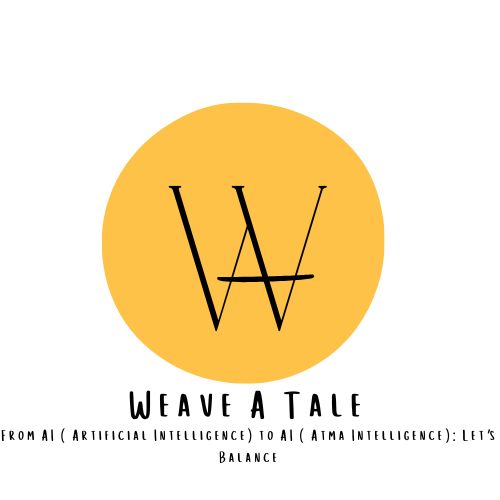
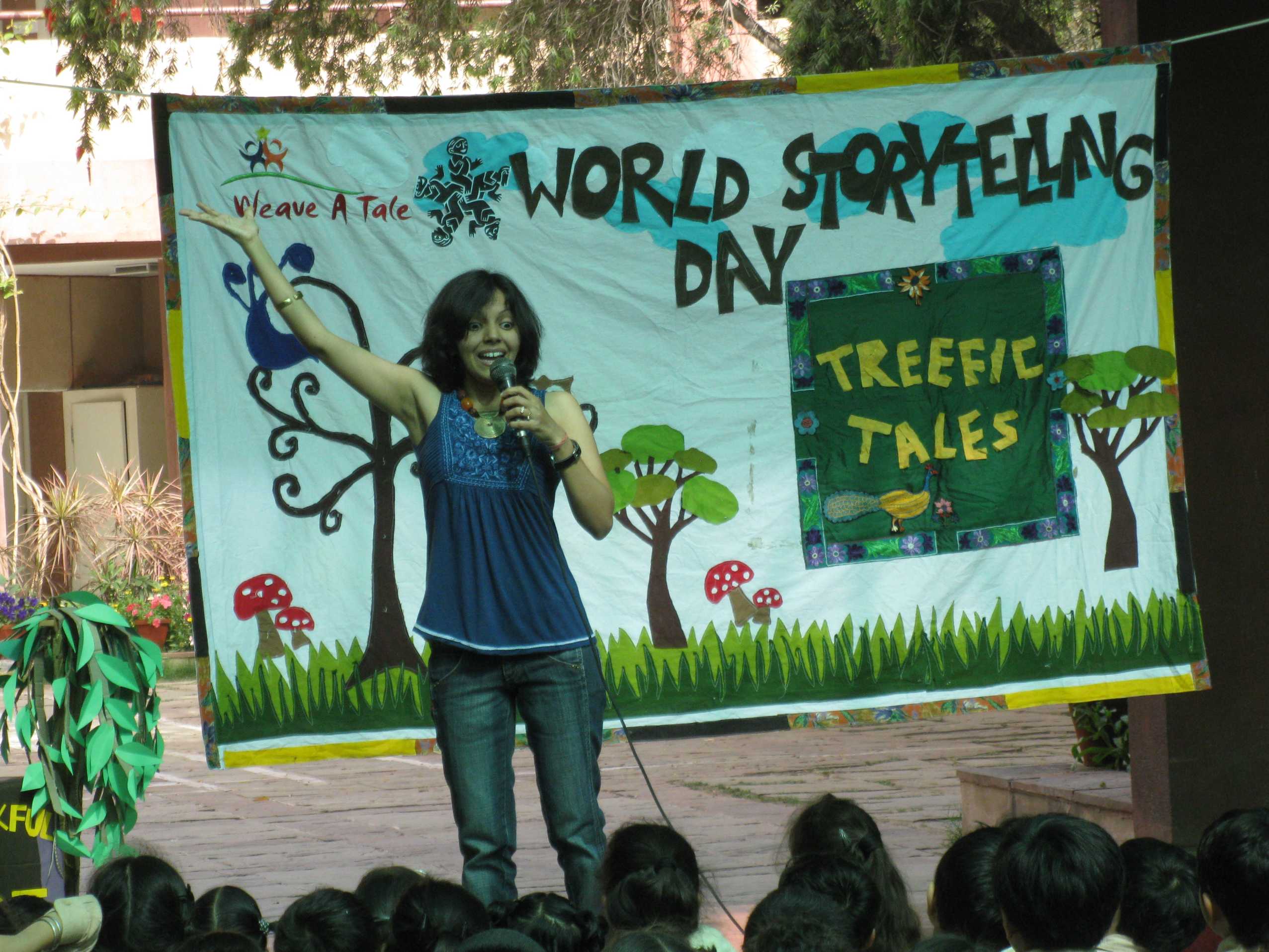
At Weave a tale, we are always a ‘Work in progress’. We are not a ‘know it all’ but ‘learn it all’ or learn as much as finite potential permits. Tread with caution. Keep your sifting tools handy. Sift the sand but lose not the Pearls.
What We Do
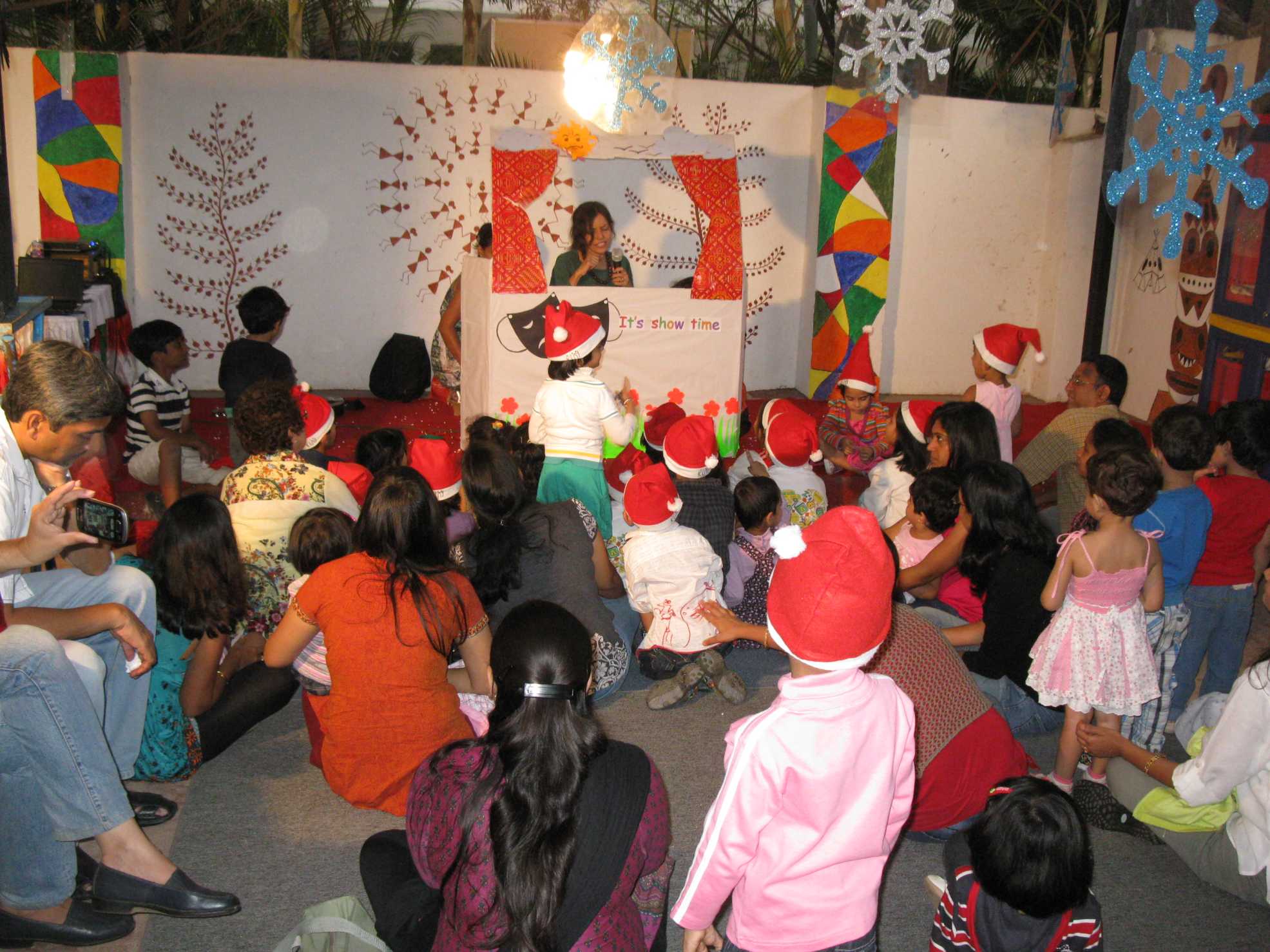
Story Telling
Weave A Tale is a springboard for re-igniting minds and re-imagining education through creative and inspiring stories.
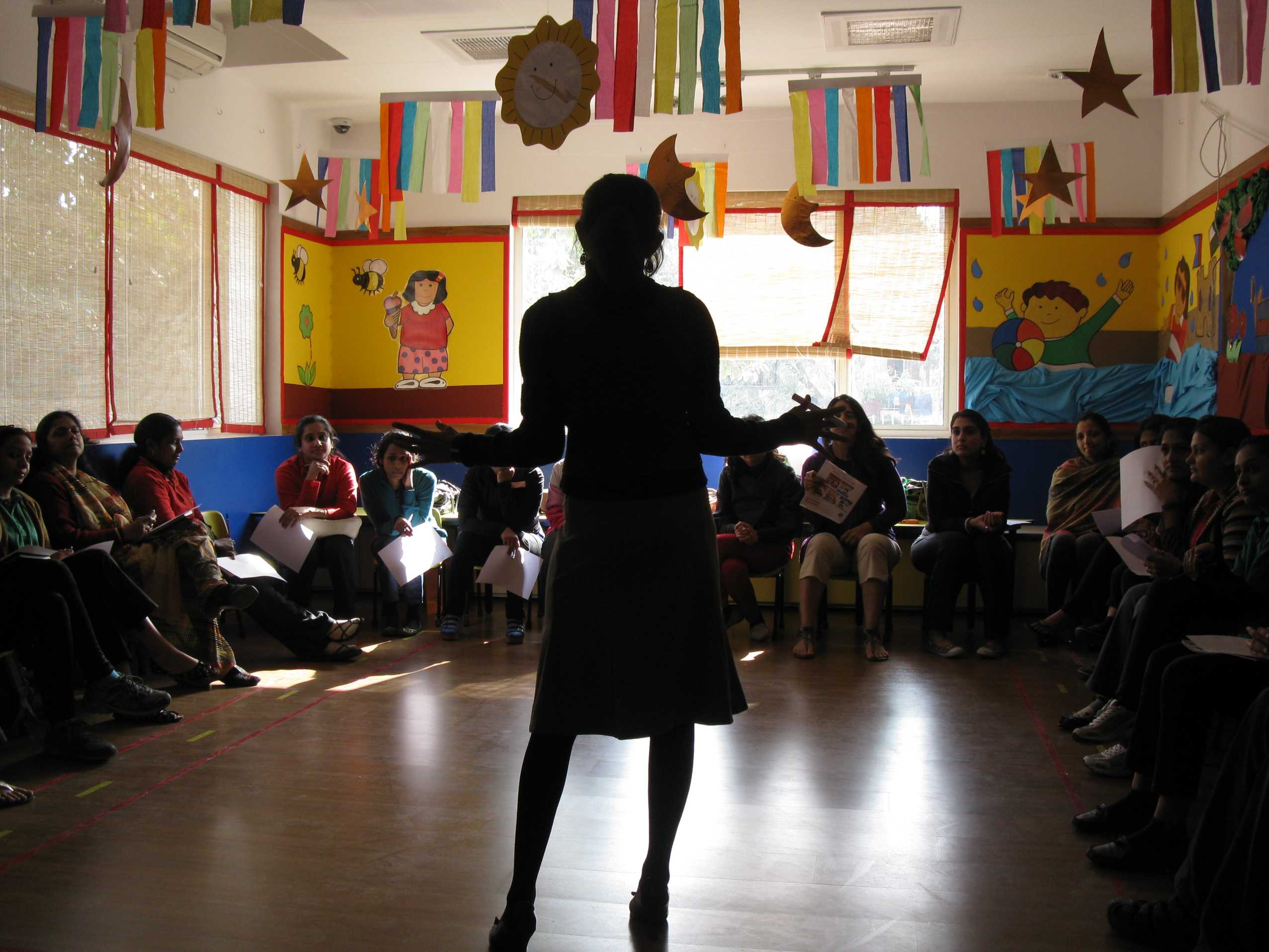
Teacher Training
Our team is dedicated to providing engaging and effective teacher training programs that help educators develop the skills and knowledge they need to succeed in the classroom.

Workshop
We offer a wide range of workshops for children and adults that are designed to be fun, interactive, and educational. Whether you’re looking to learn a new skill, explore a new topic, or just have some fun, we’ve got you covered
Weave A Tale So Far
Indicative List Below
Weave A Tale in Media
Corporates
- Microsoft India R & D Pvt. Ltd., Bengaluru
- Infosys , Bengaluru
- Amar Chitra Katha , Bengaluru
NGOs
- Katha
- Vidya and Child
- Parikrma Humanity Foundation
Schools
- National Public School , HSR , Bengaluru
- Global Indian International School, Whitefield , Bengaluru
- Inventure Academy, Whitefield-Sarjapur, Bengaluru
- Greenwood High School, Sarjapur, Bengaluru
- Vasant Valley School, Delhi
- Julia Gabriel Centre, Vasant Kunj, Delhi
- Klay Prep School And Day Care, Whitefield Road, Mahadevpura, Bengaluru
- Bright Beginnings, Preschool , Whitefield, Bengaluru
Others
- Bookaroo Festival , Delhi
- Katha Utsav , Delhi
- Pratham Books
- The Hippocampus Children's Library, Koramangala , Bengaluru
- Bangalore Schools Expo 2020
About Us
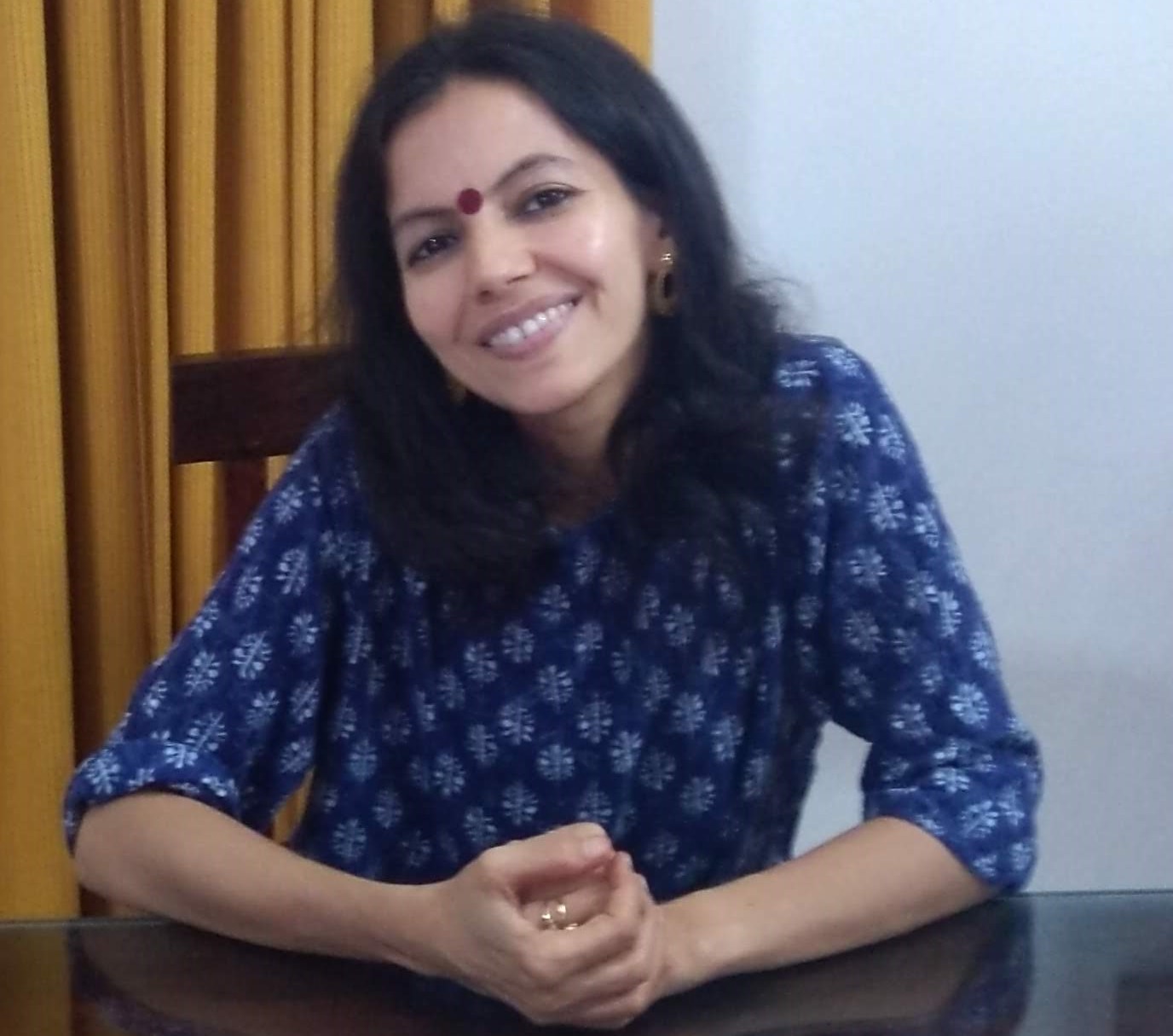
Savi Sarin, Founder, Weave A Tale
Savi, likes to be known as a WIP (Work in Progress). Beneath all the epithets and adjectives used to describe Savi (mother, educationist, raconteur, performing artist, entrepreneur, nature lover and a dreamer), she is just a being (not omniscient), an ephemeral being. She is learning each day what it is to be a HUMAN (Manurbhava)and striving hard to be one, by learning, unlearning, relearning and evolving. In the warp and weft of life, we weave many tales, and in doing so we are woven together in elegant tapestries. Through these narratives, she is trying to understand the mysteries of the Universe, her place in it, how we all are connected in this fabric of shared meaning and a vision of a world that is meant for ALL, a world that is safe for ALL. In her more than four decades of existence, she gathered many degrees and certificates from hallowed portals of the country and the world. However, she feels she has collected more intangible, yet rich, experiences and narratives, than tangible documents. A lifelong learner Savi has come to realize that Life is one of the best schools, and we learn best by DO and DIY (Doing it yourself). Savi has varied interests. As a multipotentialite, she thrives on learning, exploring and mastering new skills. Weaving different ideas together in creative ways, through stories or otherwise, is her forte. In her pursuit for creative ways of learning and teaching, she founded Weave A Tale (a springboard for re-igniting minds and re-imagining education), more than a decade ago. Besides Yog, Adhyayan, Lekhan (writing), Nritya, Sangeet and Abhinaya, there is another Kala (skill) that piques her interest, and that is Pak Kala (cooking). Just like herself and her cooking, her stories too are SLOW. With a dash of various rasas, they are Served with Love, are Organic and Warm. It is the need of the uncertain and unprecedented times Humanity is living in today, more than ever. She concludes by saying, " Each one of us is a story waiting to unfold and be told. What we live today will be Tales of tomorrow, so let us Weave some inspiring Tales. Let us tell the tales we live and live the tales we tell."
II Sarve Bhavantu Sukhinah II
Blog
RE-IMAGINING PEDAGOGIES: BACK TO BASICS: AGENCY, AFFECTION, ATTENTION
(Savi Sarin CPAR IP2019)
Abstract:
Teaching does not always lead to learning. Learning is independent of teaching. It is a product of Learner’s agency and engagement. This brings us to a few existential questions we need to ask before we delve into Pedagogy. In this paper we shall look at the questions such as, whom to teach? Why to teach? What to teach? before we get to, how to teach? While trying to answer pertinent and pressing issues related to learning we shall attempt re-imagining pedagogies for the 21st century learners.
Key Words:
Affection, Health, Machine learning, Brain changers, Homo empathicus
Summary:
“While we try to teach children all about life, our children teach us what life is all about”. Angela Schwindt Shouldn’t we then question, who is a better teacher, pedagogue? Whom are we trying to teach? We are trying to teach the most imaginative and intelligent part of Humanity called Children. Thinking of pedagogies, that too imaginative, without thinking of the child and her agency is counterproductive. Children are wired to be joyful learners, until we adults think that these little beings, with no agency, need to be trained in a certain way, thus being kill joys. The mismatch between what modern child psychology tells us about how children learn, on one hand, and the expectations embedded in school curricula on the other, is so sharp and violent in our country that it looks an exercise in redundancy to identify little examples (Kumar K, 1992, p4.) When such is the case, it would be preposterous to keep Cognition ahead of Affection. Affection one of the biggest endorsers of learning. All children need is, to be heard, to be loved, trusted and respected for who they are. Once that is taken care of everything else falls in place. Positive childhood experiences can develop, enhance and even alter the neurocircuitry of the brain. Hence, the teachers/ responsible adults play a very crucial role here. They act as ‘Brain changers.’ It is not the instruction that is critical for learning, it is the emotion. The narrative in education these days is slowly shifting from IQ to EQ. But there is still something wanting. To nurture Homo empathicus (Humans with empathy) of 21st century, we as adults are responsible and accountable to provide for their physiological, social, emotional needs first and foremost. It is also imperative that children are surrounded by responsive adults with integrity. Adults, whose thoughts match their words and those match their action, not those who are suffering from the disease called COMPARISONITIS. Children need nourishment for body and mind, they need open, green, safe environments, not gas chambers to grow into happy holistic beings. We cannot reverse the order of things. The Annamaya, Pranamaya, Manomaya Koshas have to be nourished first, only then can we touch the Vignanmaya kosha and ultimately the Anandamaya Kosha (Bliss). The hierarchy of needs has gone all topsy turvy and we have reached a time in history where children have to speak up and shout out loud for their basic rights. We are failing miserably as half of humanity is losing faith in so called grown-ups. Time to revisit the basics, ‘Loka samasta sukhino bhavantu’ something that used to be our motto of life and education eons ago. As in health/ medicine, so in education, Prevention is better than intervention. We need to look at 5 H’s not just 3 H’s. When the first four H’s, that is, Health, Heart, Hand and Head are taken care of, the fifth H, the ever so elusive, Happiness shall ensue. To conclude, when an adult(s) with integrity is/are tuned in and pay attention to the needs of a child(ren), he/she wouldn’t take long to figure out that Affective pedagogy leads to effective learning, which in turn leads to Happy children exuding positive self-esteem. That is the most imaginative pedagogy (not just an intellectual flight of fancy but something built upon a sturdy foundation of knowledge) to prepare our children for the unforeseeable future, a future where machines are learning, and intelligence can be created artificially.
EDUCATOR SKILLS FOR 21st CENTURY: AGENCY, ATTITUDE, AFFECTION
Educator’s Conference, Bengaluru Schools Education Initiative (BSEI), Bangalore, Jan 2020
From Dark age to Information age we have come a long way. As I write this paper world is changing, at a pace that my ape brain ( debatable) can’t wrap its heads around. In this Information age where knowledge is the currency, the role of Education and therefore, that of the Educator holds a lot of meaning and importance. Here, we shall briefly discuss what it means to be an Educator/Teacher in the knowledge economy ( read 21st century) and what are the impediments for us in realizing the goals laid out. Enough has been said and written in important policy documents and conventions, (NPE 2019, SDG4, NCF 2005, Universal declaration of Human Rights, Article 26, CRC, Article 28), about the education imperatives. The implications of such policies are, one that we need to change the educational narrative, two, our role as educators becomes highly important in helping realize these goals, narrating and living stories that we tell. AI ( Artificial Intelligence) is revolutionising the educational landscape, what with a Humanoid ( Eagle 2.0), entering the classroom in our very own Bengaluru. It is hard to fathom how life will change in the next decade let alone in next 80 years, by then most of us will cease to exist. In that case how do we prepare ourselves as educators to meet the challenges of this ever-changing world, and help our students with the same? Do we fear the unknown? Do we become insecure of AI or transform into IA, Intelligent Agents driving the change?
The 3 A’s : Agency, Attitude and Affection might help us sail through the unforeseeable.
AGENCY
It implies that as educators, we understand that we are one of the main actors ( the other being the learners) in the process of teaching and learning. Ergo, we must take active responsibility for raising serious questions about what we teach, how are we to teach , what larger goals do we strive for and find our ikigai. It’s on us to make the magic happen instead of waiting for the magic to happen. The knowledge economy calls for educators to acquire new skills on regular basis, for us to ‘learn how to learn’ and become lifelong learners; to have orientation to different and divergent modes of thinking. It requires us to be transformative intellectuals. The educator of 21st century need to be a design thinker, a creative thinker, a critical thinker. One who has deep empathy for her learners, who observes them, understand their needs (physical, emotional, social), design learning for and with them, ideate, create, collaborate, make mistakes, recalibrate, reflect and share the learning with the community of other educators and learners. As educators and custodians of knowledge our job is not just to introduce pupils to the “many mansions of the heritage” as we ourselves strive to live in but to also develop critical thinking in them, welcome their questions and provide them with honest reasons. We do not have to be a sage on the stage, rather be humble enough to accept critical challenge, showing that like us, the teaching context could be fallible too. Quite a tall order. How are we to engage students in critical and equity pedagogy when we are the products of assembly line education and have been trained in management pedagogy rather than critical one. There are plethora of impediments onto this journey of becoming a transformative intellectual. Of the biggest one is:
ATTITUDE
How is a teacher to bring about such transformation when, the FedX (as Sir Ken Robinson cputs it)) the non-thinking, delivery guy’s, job is to carry out the dictates of experts who are far removed from the everyday reality of the classrooms. Do we educators have any scope of addressing the public apathy shown towards our profession or do we lack the willingness to ask questions? It seems to be a two-pronged issue which needs us to have agency and urges a shift in our attitude and that of public. Systemic reforms in education are long due. Such reforms can only be carried out on the shoulders of educators. It’s time we bring the halo back to the teaching profession. It’s time we empower ourselves, if no one else cares to do so. If the ‘Pygmalion in the classroom’ holds true for the performance of the students, won’t it hold true for the teachers as well, who are always considered as non-achievers, paid poorly, always burdened with the extra academic responsibilities which eat into their instructional time. However, when the going gets tough, the tough one gets going. A self-aware, committed and thoughtful teacher having a growth mindset would be able to address the many challenges of praxis. Time for Reflection. In my forty years of existence I have seen a lot of change, outside and within. Change is inevitable and no one welcomes a change more than a wet baby. But I can say this with certitude that some things have not changed, and they never will ; The Human values, Human emotions, how we relate to each other, the way we feel and think, the very foundations of Humanity. The existential questions that bothered humans thousands of years ago intrigue our minds even today. Hence, as a mother, educator and a storyteller I feel Affection is the most important skill that ever was and ever will be needed by educators, whether in this century or the next.
AFFECTION
Quoting Maya Angelou, “People will forget what you did or what you said but they will always remember how you made them feel.” I can still remember how my teachers made me feel when I was at school, some negative and many positive memories. But it was the latter that became one of the driving forces in my becoming an educator. Affection is one of the biggest endorsers of learning. Positive childhood experiences can develop, enhance and even alter the neurocircuitry of the brain. Hence, the educators act as ‘Brain changers.’ It is not the instruction that is critical for learning, it is the emotion, the EQ. Therefore, to care and show genuine affection towards our students is the most important skill needed by Educators. To nurture Homo empathicus ( Humans with empathy) of 21st century, where machines are learning, and intelligence can be created artificially, it is imperative that children be surrounded by responsive adults with integrity (whose actions match their words and words match their thoughts). To conclude, Educators of 21st century need Agency, Positive Attitude ( Growth Mindset) and Affection to conquer the Goliath of Technology. As humanity is getting into the grips of technology and as real human interactions will become few and far between, educators with their hearts in the right place will be indispensable and needed to show the way.
References
- Dweck, C.S.(2017) Mindset : Changing the way you think to fulfil your potential
- Giroux, H. A. (1988) 'Teachers as Transformative Intellectuals' in Teachers as Intellectuals: toward a critical pedagogy of learning. Westport, Bergin and Garvey.
- Banks McGee, C.A., Banks , J. A., (1995) “Equity Pedagogy: An Essential Component of Multicultural Education “ in Theory into Pratice, vol. 34 (3)
- NCF, 2005
- National Education Policy Draft 2019
- Sustainable development Goals UNDP
- Centro de Estudos Sociais, Universidade de Coimbra, Summary report , WP 14 - Teachers as Transformative Intellectuals
- French, R. & Kingdon, G.: The relative effectiveness of private and government schools in Rural India: Evidence from ASER data
- Singh,R. & Sarkar, S. : Teaching Quality Counts: How Student Outcomes Relate to Quality of Teaching in Private and Public Schools in India
- Stevenson, L., Haberman, D.L., Ten theories of Human Nature, (Oxford, University of Oxford Press, 2004), Based on ‘Introduction: Rival Theories and Critical Assessment’ and ‘Conclusion: Towards a synthesis of theories?’
- 8. Dearden, R.F., The Philosophy of Primary Education (London, Routledge & Kegan Paul, 1968), from Chapter 6: Learning and Experience
- Barrow & Woods: Creativity:Introduction to Philosophy of Education, 1988
- Robinson,K.: The Element & Do Schools kill creativity.
Gallery
Femina Magazine : Femina Parenting Issue Year 2012
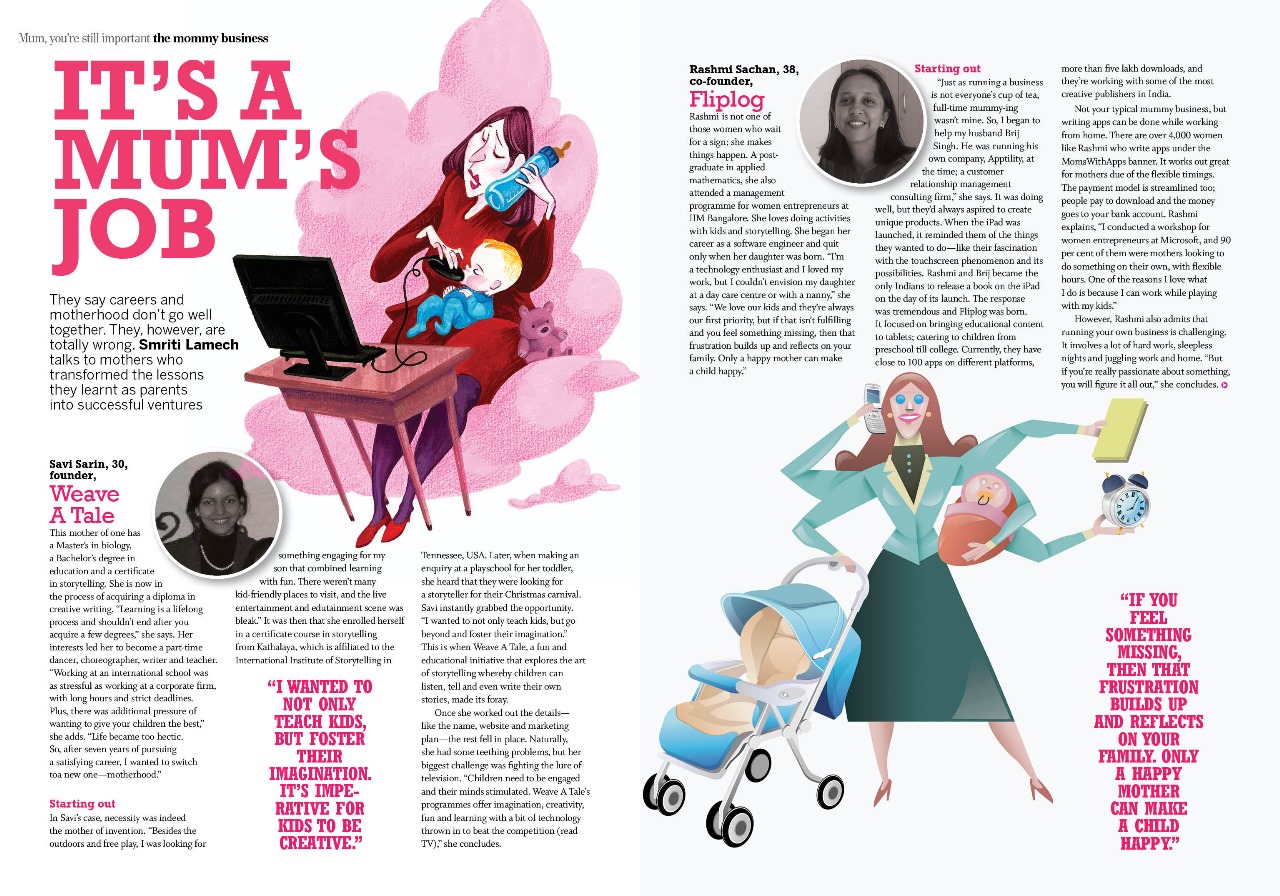
Play "Chappal ki Dukaan Aage Hain" , Atta Galatta, Koramangala, Bengaluru, Feb 2020
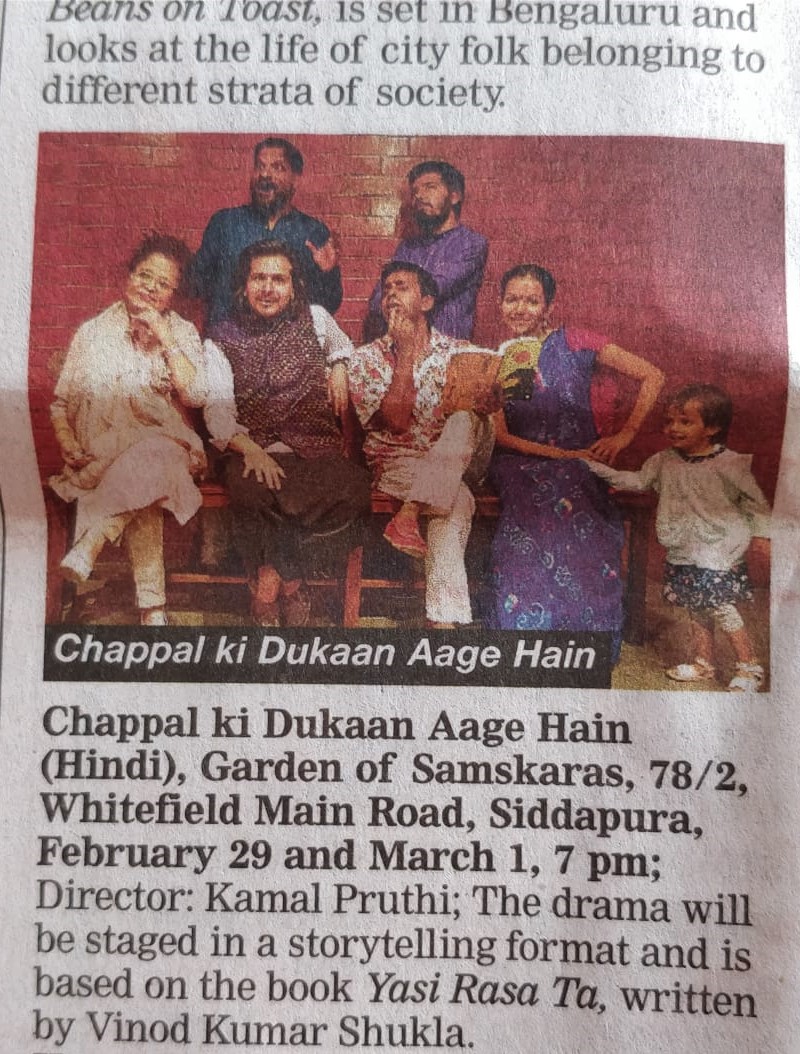
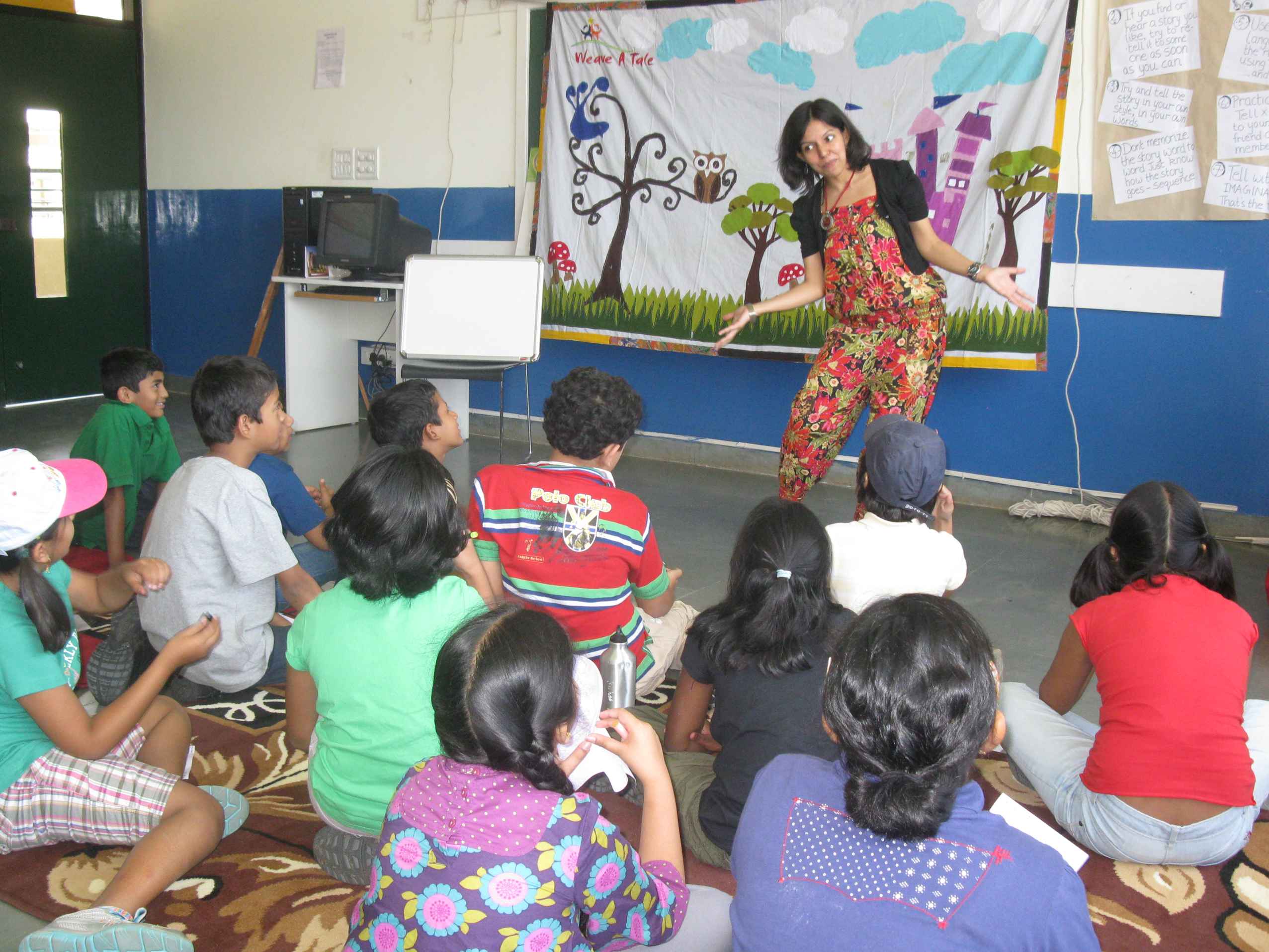
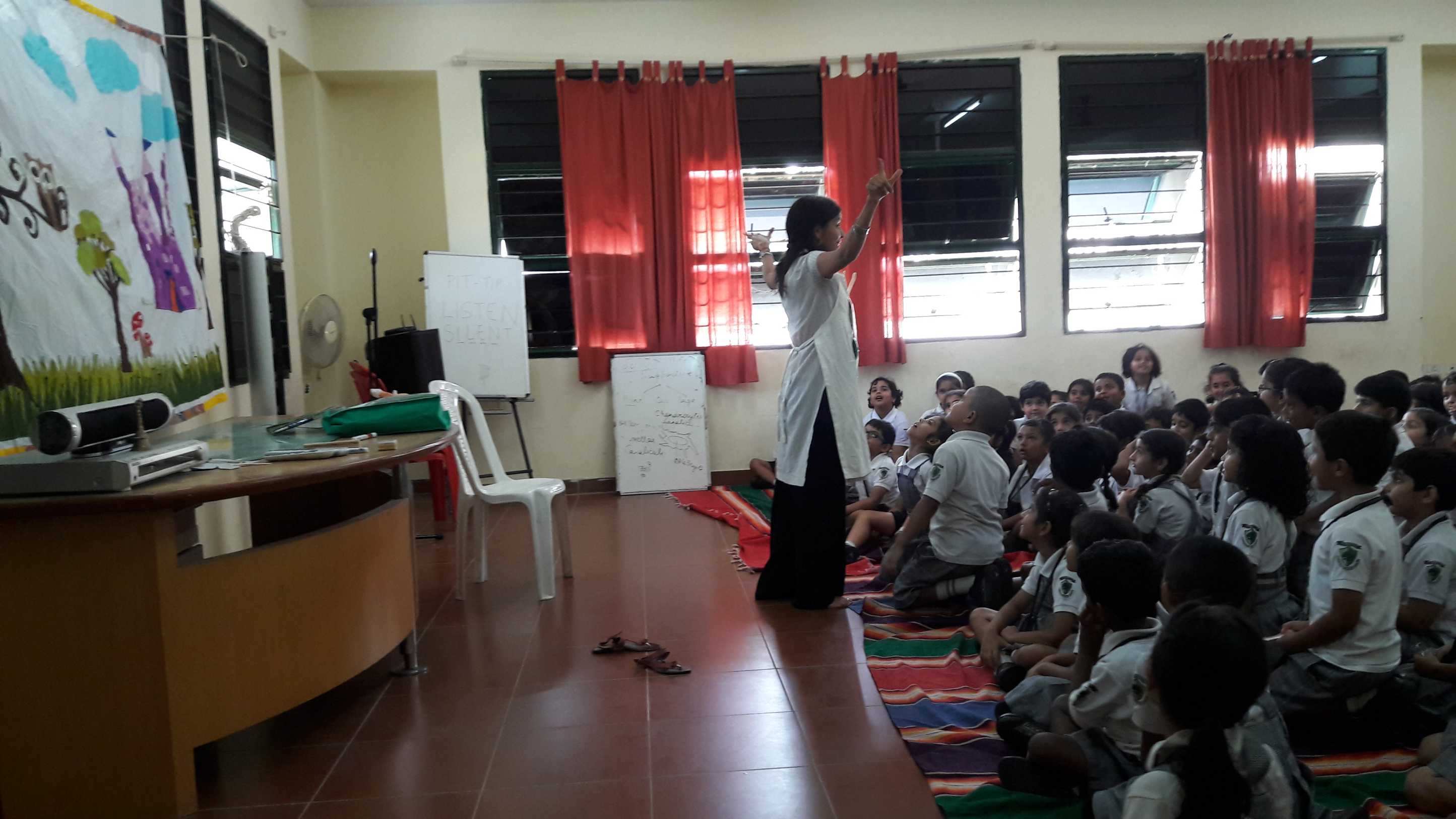
Bangalore Schools Expo 2020
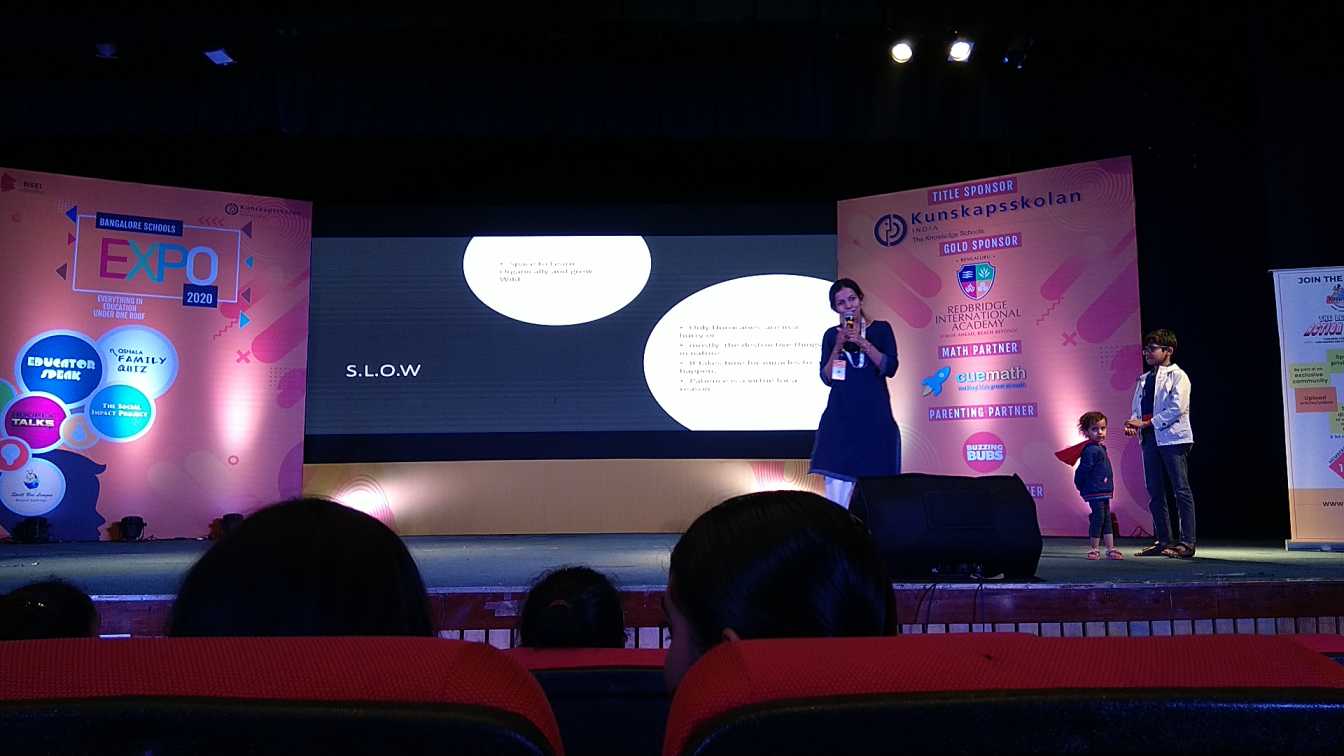
Contact Us